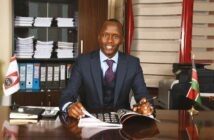Days of permanent and pensionable employment terms long gone
By CPA Daniel Mureithi
Millennials is a term that most of us have become familiar with. It is generally argued that this forms a demographic cohort following Generation X and consists of people born between the 1980s and 2000s. They are also known as Generation Y or Gen Y and are believed to possess the following traits; tech-savvy, digital natives, can-do attitude. They are diverse, global citizens, entrepreneurial, multitaskers, risk-takers, not fond of rigid working environment, and are generally productivity-oriented. It is believed that this is the most connected generation in
history.
As it is, millennials currently occupy a larger portion of the workplace, and in today’s age it is essential for employers to create an employee-centric culture that fosters productivity amongst this expanding demographic. Often times, they unsettle the status quo for they question everything. It is projected that by the year 2020, millennials will represent about 50% of the workforce globally.
A Human capital remains pivotal in almost all organizations. Developing a working environment that keeps the millennials engaged is one of the greatest challenges for employers in recent times. The traditional employee motivation and engagement initiatives are no longer effective. This generation abhors rigidity in the working environment. Their global-citizen nature pushes them to deeply desire global experiences. Most employment and human capital policies and employee codes of conduct are reasonably threatened!
The conventional perspective is that millennials aren’t planning for the future; they are happy to sacrifice future financial stability for in the-
moment living. Signing up for mortgages, buying plots and buying houses are the least of their priorities in life. This generation seems to have no
permanency perspective. They consider such possessions as quite old school and considerably limiting for their liking. And so is retirement planning! Consider Enos, a smart, intelligent and ably gifted young man who we recently recruited and offered what would be considered as the best package to keep him engaged to fully dedicate his rather unique skills
in technology to our organisation. On examining the package, we had offered him, he quickly requested for a meeting seeking a more flexible approach to the package, key among the subjects, pension contribution. His idea was that, instead of contributing to a pension scheme that would be accessible only upon retirement, he wished that the same could be repackaged to offer him a benefit that would allow him to travel the world every now and then!
Millennials came of age in unstable economic times and feel betrayed by
the financial system. It might take persistence to earn both their attention and trust. They were taught that the road to happy retirement is in predictable successive steps;
i. Go to school
ii. Get a job that gives great benefits
iii. Climb the company’s corporate ladder
iv. Contribute to your pension
v. Wait until age 60 to stop working, and then do what brings you joy; “retire”
Outdated, far away, and boring is how millennials would generally describe the word “retirement.” The question that lingers loudly in their minds is why one would delay to enjoy the fruits of their labour but instead defer it to an uncertain future. Experiencing the world, different cultures and looking for learning opportunities is what appeals to them more. We have witnessed the generations before, pushing happiness aside, working until 50 years or beyond, and still be without the mental and financial freedom they dreamt of having. This idea doesn’t excite millennials as they yearn for a life much more fulfilling. They want to be mentally fulfilled and financially free without having to work thirty years plus for it.
Now, despite the differences from generation to generation, we all want
to be financially free at some point in life. However, if millennials want to become financially secure at an earlier age, we must throw out the traditional model, and start creating a new plan of action. Human Resource Professionals may be forced to treat retirement plans like a product and promote it through marketing campaigns just like other products and services. However, there still remains various avenues to explore by the millennials and employers alike in order to have a more fulfilling life and
workforce.
- Employee Share Ownership Plans
(ESOPS)
Companies that offer a great Employee Share Ownership Plans ESOPS) for their employees’ can attest to the magic role this plays when it comes to employee motivation. By being awarded - Increase your income by having more streams of income
Employers need to face it; financial freedom is not simply a need for this generation but employers also have a responsibility to encourage their employees to venture in other income-generating activities. This ought to be incorporated in the employee wellness programs. To become happy and financially free, millennials may have to venture out and develop multiple streams of income. Whether it is through a
second job, business, and/or side hustle, they must make sure that they do not spend their entire life depending on one primary source of income. It is hard enough to bring in one stream of income, but having money come from multiple directions is the key to financial independence. Unfortunately, not everyone has the idea or desire to start their own business, so entrepreneurship doesn’t have to be the only option. Converting one’s car to a cab on the weekends is a workable option. This is a simple and easy way to bring in additional income while still controlling one’s time. Managing social media accounts for small businesses could be another. One of the key advantages of millennials is that they understand both technology and social media. This is an easy avenue to charge a monthly fee to provide social media expertise by managing social media accounts. Whether one is great at writing, data entry, research, marketing, graphic design, website design, and more, there are numerous freelance platforms that can help in bringing in that additional income. - Save, but above all invest Savings in Saccos is considered one of the
most prudent ideas in Kenya. However, saving alone is not enough to build wealth. Saving money will not really bring in that financial freedom unless there are deliberate aspirations to invest for the long-term. Saccos help to accumulate savings which one can thereafter be used to access loans that could help to unlock various investment opportunities.
Contrary to the popular belief however, retirement planning is important to millennials. Like all employees, millennials need support and education. Consideration for a stable financial future is key. Whether using the traditional models of retirement saving plans, or through other wealth creation opportunities, planning for old age starts now. Helping them to understand these programs makes you stand out as an employer in the talent marketplace. What and how you communicate it to them is the issue.




